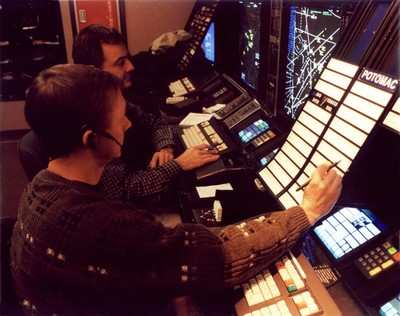FAA Questions Magnitude Of Those Issues
The National Air Traffic Controllers Association told ANN this
week three more air traffic controller trainees have resigned from
the Oakland Air Route Traffic Control Center in Northern California
over the past week, bringing the total number who have quit to 14
in the past year. In a normal year, there are only one or two
resignations at this facility, according to the controllers
union.

ANN has reported extensively
on the contentious battle between controllers represented by NATCA
and their employer, over pay and benefits since the FAA imposed a
new contract last June, following several months of fruitless
negotiations and the FAA's declaration of an impasse.
NATCA states there are currently 161 fully certified controllers
on staff at Oakland ARTCC (ZOA), which the union asserts is 98
short of staffing levels established by the FAA and NATCA in 1998.
That total is also short of the absolute minimum of 175 controllers
called for by updated numbers the FAA released in March... numbers
the union claims were put in place without formal study, or
justification.
FAA Western Region spokesman Ian Gregor tells ANN that right off
the bat, "NATCA is wrong." He says there are actually 171 certified
controllers at Oakland, as well as 94 "developmentals" (trainees.)
Of those controllers in training, 59 are certified to conduct at
least some air traffic control operations, as part of ongoing
training.
Gregor also questions the true magnitude of staffing problems at
Oakland Center.
"I don't think it's anything unusual," Gregor said. "We expected
a wave of controller retirements, as those hired after the PATCO
firings in 1981 become eligible. We have a plan in place to handle
that."

As for that plan, Gregor concedes it isn't SOP to have 100
developmentals onboard at a facility... but says given the high
number of trainees, it's to be expected that some will leave the
program. "The number NATCA claims have left -- 14 -- still
represents close to a 90 percent success rate," he notes. (NATCA
also notes another six people have failed the training
program.)
NATCA says Oakland Center has lost a total of 32 controllers and
trainees since the FAA imposed work rules, including five
experienced controller retirements and seven controllers who left
their positions to take FAA supervisor jobs at the facility.
Despite those numbers, Gregor says the staffing situation at
Oakland isn't cause for alarm.
"Controllers [at Oakland] do not generally work overtime or
six-day weeks, other than for training purposes," Gregor says.
"They are also using all of their annual leave; when someone
requests a vacation, it isn't denied. This shows we've staffed
properly."
As with almost any labor situation, the big question seems to
come down pay... and NATCA says trainees who chose to quit the
program are citing that as the main reason for exiting, stage
right.

"I have been at Oakland Center since September 2006. It is one
year later, and I am still at the same salary that I came in at,"
said trainee Douglas Ridgeway. "I am also making almost $1,000 a
month less than I was when I made the decision to separate from the
Air Force. ... I sought a career in the FAA so I could make good
money and not have to live paycheck to paycheck. Not so I could go
into debt."
Ridgeway, who had six years experience working radar control in
the military, was "cruising through the training program," in the
words of Oakland Center NATCA Facility Representative Scott Conde.
"He is now leaving the FAA to go to work for a contractor in
Afghanistan."
A husband and wife also resigned from Oakland ARTCC last week,
according to NATCA. They also cited pay.
"The FAA has been a long time dream job of mine, and has turned
out to be WAY less then I expected," said Patricia Murgatroyd, who
along with her husband, Joseph, chose to leave the training
program. "The pay is way less than I was originally offered. The
management can’t seem to answer questions asked of them.
Nobody seems to know the answer to anything except for the
controllers who know how to do their jobs, and they are the ones
getting the short end of the stick."
Murgatroyd also said O/T remains a problem at Oakland ARTCC,
contrary to Gregor's assertions.
"There is so much overtime available and everyone keeps taking
their name off the list because if you are on the list you only get
one day a week off every week," she said. "People are being pushed
through training either way to fast or not getting any training at
all. Either case isn’t very safe.
"I love air traffic control and hope to one day to be able to
return to the FAA if things ever get better; if the FAA ever
realizes that it cannot function without the air traffic
controllers and that not just anybody can be an air traffic
controller."

Gregor doesn't argue controllers are making less to start than
they used to... but he says trainees knew what they signed on for
from the start.
"People enter this job with their eyes wide open," he told ANN.
"The pay isn't a secret. We made it clear for the better part of a
year what we intended to do with pay, to bring it more in-line with
other government positions.
"We're not seeing anything particularly unusual in the ZOA
training program attrition rate, and that we're confident that
we're training the right number of controllers to replace the
controllers that we expect will retire or move to other facilities
in coming years," Gregor added.
 Airborne 11.05.25: Tesla Flying Car?, Jepp/ForeFlight Sold, A220 Troubles
Airborne 11.05.25: Tesla Flying Car?, Jepp/ForeFlight Sold, A220 Troubles Airborne 11.07.25: Affordable Expo Starts!, Duffy Worries, Isaacman!
Airborne 11.07.25: Affordable Expo Starts!, Duffy Worries, Isaacman! Aero-News: Quote of the Day (11.05.25)
Aero-News: Quote of the Day (11.05.25) ANN's Daily Aero-Linx (11.05.25)
ANN's Daily Aero-Linx (11.05.25) NTSB Prelim: Cirrus Design Corp SR22
NTSB Prelim: Cirrus Design Corp SR22






